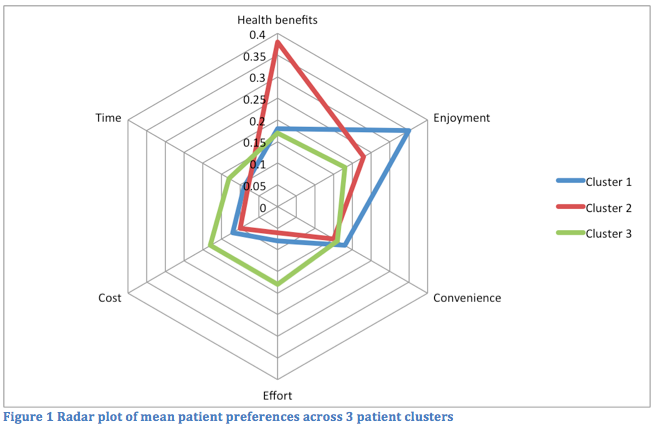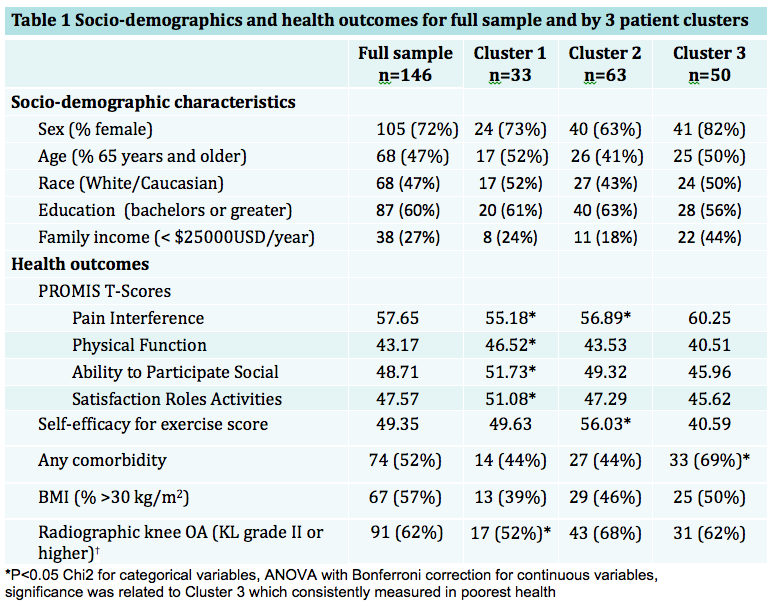Session Information
Session Type: ACR Poster Session C
Session Time: 9:00AM-11:00AM
Preferences For Physical Activity: A Discrete Choice Experiment In People With Chronic Knee Pain
Background/Purpose: Understanding preferences for physical activity (PA) can help guide patient consultations. The purpose of this study is to discover the relative importance of attributes associated with the decision to engage in PA for adults with knee pain and to identify whether clusters of adults with shared preferences exist.
Methods: A discrete choice experiment was conducted using the PAPRIKA method to determine the relative importance of six attributes: health benefit, enjoyment, convenience, financial cost, effort, and time cost. All participants completed health history questionnaires, patient reported outcomes, and standing knee radiographs. Cluster analysis was performed to identify clusters (subgroups) of adults who place similar importance on attributes. Differences in sample characteristics between clusters were assessed using chi-square for categorical variables and ANOVA with Bonferroni correction for continuous variables.
Results: The study sample included 150 adults; 47% were 65 years or older, 72% female, 47% white, non-Hispanic, and 41% black, non-Hispanic. The six attributes in decreasing order of importance (mean weights) were: health benefit (0.26), enjoyment (0.24), convenience (0.16), financial cost (0.13), effort (0.11) and time cost (0.10) (see Figure 1). Table 1 reports on socio-demographic and health outcomes of the full sample and by preference cluster. Three clusters are found in Table 1: Cluster 1 (n=33), for whom enjoyment (0.35) is twice as important as health benefit; Cluster 2 (n=63), health benefit (0.38) is most important; Cluster 3, all attributes are equally important. Cluster 1 was healthiest (e.g.,best self-reported health, lowest BMI), Cluster 2 had greatest exercise self-efficacy, and Cluster 3 had greatest number of participants with ³1 comorbidity.
Conclusion: In the full sample, health benefit and enjoyment are the most important attributes associated with the decision to engage in PA, whereas financial cost, effort and time are much less important. Distinct subgroups place different relative importance on the attributes. These findings may help to better target interventions to increase PA engagement.
To cite this abstract in AMA style:
Pinto D, Bockenholt U, Chang RW, Lee J, Holl J, Finn D, Sharma L, Heinemann A, Hansen P. Preferences for Physical Activity: A Discrete Choice Experiment in People with Chronic Knee Pain [abstract]. Arthritis Rheumatol. 2017; 69 (suppl 10). https://acrabstracts.org/abstract/preferences-for-physical-activity-a-discrete-choice-experiment-in-people-with-chronic-knee-pain/. Accessed .« Back to 2017 ACR/ARHP Annual Meeting
ACR Meeting Abstracts - https://acrabstracts.org/abstract/preferences-for-physical-activity-a-discrete-choice-experiment-in-people-with-chronic-knee-pain/


